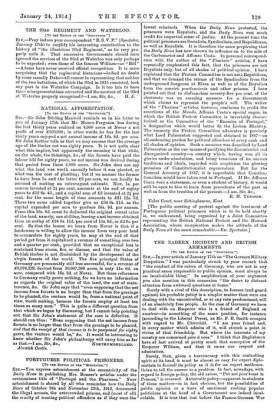NATIONAL AFFORESTATION.
[To ass EDITOB OF TOR ••Brt.crktor."1 Sir.,—Sir John Stirling Maxwell reminds us in his letter to you of January 17th that Mr. Munro-Ferguson has during the last thirty years realized on 4,000 acres at Never a net profit of over £100,000; in other words, he has for the last thirty years enjoyed a net annual income of 16s. 83. per acre. Sir John further tells us that we may assume that the average age of the timber cut was eighty years. It is not quite clear what this implies, but apparently the meaning is that while, on the whole, the thinnings, Sic., of the forests have paid the labour bill for eighty years, no net income was derived during that period from these 4,000 acres. Sir John does not say what the land was worth annually before it was planted, or what was the cost of planting; but if we assume the former to have been Is. and the latter 23 per acre, we can hardly be accused of making an extravagant estimate. Now, Is. per annum invested at 2i per cent, amounts at the end of eighty years to £12 8s. 4d., and a capital sum of £3 invested at 21- per cent, for the same length of time amounts to £21 Ifs. 7d. These two sums added together give us £34 Os 11d, as the capital expended per acre to produce 16s. 68. per annum. From this 16s. 8d. must be deducted the original rental value of the land, namely, one shilling, leaving a net income obtained from an outlay of £34 Os. Ild, per acre of 15s. 8d., or £2 6s. per cent. So that the lesson we learn from Novar is that if a landowner is willing to allow the income from very poor land to accumulate for eighty years, he may at the end of that period get from it capitalized a revenue of something over two and a quarter per cent., provided that no exceptional loss is sustained from storm, fire, or disease, and that the value of British timber is not diminished by the development of the virgin forests of the world. The five principal States of Germany are presumably still less successful, for a revenue of 0,084,129, derived from 10,607,368 acres, is only lie. 6d. an acre, conspired with 16s. 8d. at Mover. But these references to Germany really prove nothing, for we have no information as regards the original value of the land, the cost of main- tenance, &e. Sir John says that "even supposing that the net income from forests is no larger than that from the grazings to be planted, the venture would be, from a national point of view, worth making, because the forests employ at least ten times as many men." This is quite a different question from that which we began by discussing, but I cannot help pointing out that Sir John's statement of the case is defective. It should run thus: "Even supposing that the net income from forests is no larger than that from the grazings to be planted, and Mat the receipt of that income is to be postponed for eighty years, the venture would be," &c. It would be interesting to know whether Sir John's philanthropy will early him as far






































 Previous page
Previous page